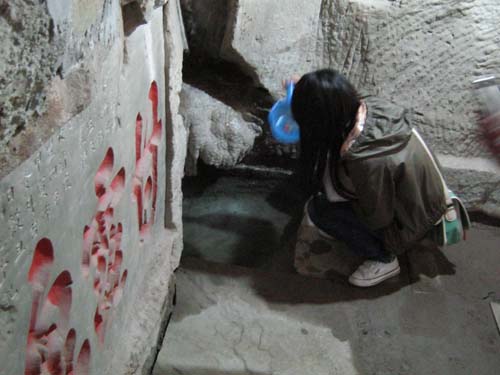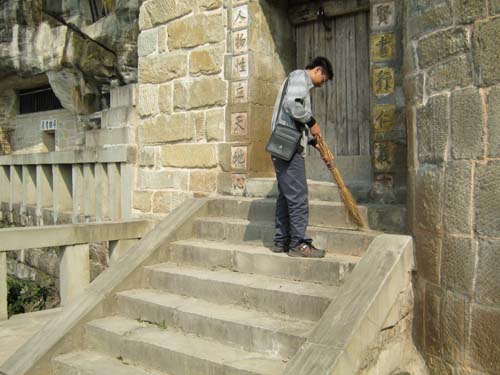| We finally arrived at the Scripture Crag for Happiness. Before we walked up to the gate we could see a stone door carved with “Natural Fun”, with couplets of “Reading the books and doing the deeds of sages, developing the character and making resolutions of great men” on both sides.
 |
| Listening to the administrator carefully in interviews |
Before we went in, the classmates ahead tried to open the door but failed, so we went to help them. Finally we found that the wooden door was 6-7cm thick and got some breaks after centuries of erosion by wind and rain. Generally speaking, the items made of wood would get eroded in a short time, but this wooden door was not the case, which suggested how clever the people at that time. The first spot we saw after entering the door was “Washing Pool”. Seeing black water in it, some teachers and students supposed that the pool was the place for washing out ink, but I did not think so because there were some black moss under the water. When we were arguing about this, a student said, “Look!” We turned to him on hearing this and found there was a regularly arched stone wall on the right of the entrance, so we guessed that it was the former entrance.
 |
| Drinking the spring water in the cave |
The administrator came over and showed us around the Jia’s Cave. We saw the plate of “Scripture Crag for Happiness” with couplets of “Thinking and doing in an upright way, feeling no shame before in front of God” on both sides. The administrator told us that Jia Ruzhen, the owner of the cave and also named Shanting, had no interest in power but in reading, doing good and running free schools. It took his forty years to expand caves and perfect characters. There was a cavern group with “Hall of the Cave” as the main part in the cave. The cavern group was divided into upper, middle and lower layers. Just inside the door was a hall made of rocks, in which there were stone statues of Confucius, Lord Guan, God of Literature, Goddes of Mercy, the Eight Immortals, Local God of the Land, the God of Fortune, the King of Medicine, God of Silk, Goddess of Silk and Goddess of Sending Children. A spring ever flowing out from rock crevice provided clear and sweet water. The seven caverns in the cave had their own caves connected with each other. They were now crisscrossed in the uncertain light and then winded its way upwards to a skylight, making you feel as if you were in maze. How wonderful! Jia lived here and got together with his fellows for entertainment, therefore the caves were named “Scripture Crag for Happiness”. Suddenly, we found that the four words of “Qi Yan Bu Ben” were stained with ink. We asked the administrator curiously how this could be. He told us that it was done by tourists because they wanted to copy the words. We were sad when hearing this. How could they do this just because the calligraphy was beautiful? We really wanted to tell them, “Please behave yourselves wherever you are!” Jia often talked with his friends about poetry and calligraphy and carved something on the stone walls. The sentence “Be clearer than water and be higher than mountains”, said by local people Xu Panshu, written by Zheng Banqiao and carved by Jia Ruzhen, was vigorous and forceful enough to fully show the ability and style of those big men. The administrator also told us that Jia was a kind person. He returned home when his mother died. He often said, “No flower blooms forever and no family maintain rich for more than three generations. It could be better to help others when live than to keep money until you die.” For his generousness in education business, he was honored as “Kind Jia” by local people. In addition, Jia showed his kindness to beggars as well. Beggars were welcomed no matter how long they would like to live here.
 |
| Cleaning the cave voluntarily before leaving |
The administrator told us that the words were supposed to be destroyed during the Great Cultural Revolution, but local people saved them by caking the with mud. They cleaned them after the turmoil. It was thus clear that how deeply local people loved these words. I found some concrete on the ground, but the administrator told me that it was not concrete but candle grease. I touched it with my hands and felt it was smooth. I joked that it could be sold for money. Everyone was amused by my words. The administer further told us that the county master of the time visited the cave and thought it was a place of unique scenery, so he sent a board with words “Bie You Dong Tian” and carved some words in the cave for memorial marks. He also told us that the Scripture Crag for Happiness was listed as the county cultural and historical site by the County Government in 1983 and listed as the provincial cultural and historical site by the provincial government in 1996. There was a one-kilometer concrete road connecting Dongqingchang and Jia’s Cave, which was connected to the avenue in front of the cave by concrete steps. The rescue project of the Scripture Crag for Happiness after earthquake was preliminarily completed. Jia’s hometown and the villages near the cave were built into beautiful places with green trees and tall buildings. Now the Jia’s Cave has become a unique tourist attraction in the locality that attracts countless tourists. All people highly praise Jia’s broad mind when seeing wonderful stone scenery, enjoying his teaching place and appreciating his great calligraphy works. Jia Ruzhen has left his achievements and spirit forever in the cave and the mind of people in his hometown. |

